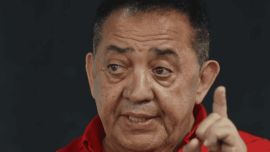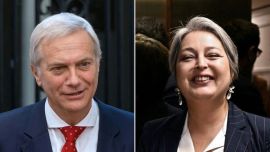Price controls on fuel suspended. The government will suspend price controls for liquid fuelds from next month, ending state regulation and passing control to the market. Energy and Mining Minister Juan José Aranguren announced the move on Monday saying “the price of liquid fuels will be decided by the market.” Aranguren said the recent rise in global oil prices had paved the way for the move, ending a period in which the state and companies that produce and refine oil set domestic fuel prices through the Agreement for the Transition to International Prices of the Argentine Hydrocarbons Industry. The agreement was designed to sustain interest levels in domestic drilling when prices dropped, but the upcoming move will give each company the freedom to set prices according to costs and their evaluation of different market rates. The government will withdraw from the deal in October, which was signed last January by the sector’s key players. Aranguren warned however that a fall in oil prices worldwide could lead to the deal’s return and said negotiations with the sector’s leading firms will continue. “The price of a barrel of crude will be linked to the value of international prices. As of October 1, the agreement is suspended (for fuel), and as the international price drops again, it is going to be taken the validity of the agreement,” added Aranguren.The official said that despite the move, there would be no immediate increase in fuel prices. Most analysts expect hikes to come after October’s midterm elections.
Prisma credit card system to be split up. The Prisma credit card and payment-processing network will be broken up to increase competition. Production Minister Francisco Cabrera announced this week. “This is an important step toward strengthening the defence of competition in Argentina,” the minister said in a statement. The government said Prisma “accepted the commitment to divest” but the details had yet to be worked out. “The measure will allow the entry of new companies to the credit card market, which will benefit businesses, consumers and the economy in general,” it said.
CNV to license new ‘investment advisors’. The National Securities Commission (CNV) announced this week it would create a new licensed position of “Global Investment Advisor,” a move that will effectively allow appointed advisors to invest the cash of Argentine citizens in assets and give the appointees the flexibility to make decisions on behalf of clients both locally and overseas.
Macri launches system to register a company in 24 hours. At an event at the Usina de Arte cultural centre, President Mauricio Macri unveiled the new ‘Sociedades por Acciones Simplificadas (SAS)’ system, which will enable citizens to set up a new company in just 24 hours online. For more information on the system, visit www.afip.gob.ar/sas.
Largest trade deficit of year in august. Statistics from the INDEC national statistics bureau show that the country registered the largest trade deficit of the year in August, reaching US$1.083 billion. July’s trade deficit was revised down however to US$785 million, from previous expectations of US$798 million. On Wednesday, INDEC said economic activity had increased 4.9 percent in July from the same month last year, recording a rise of 0.7 percent from the previous month this year.
Macri: ‘economy has taken off’. President Mauricio Macri spoke this week of his pride in the economy, declaring that it was “growing” and creating “a healthy and responsible framework so that all the Argentines can grow.” Speaking at an event with businessmen at the Presidential Residence in Olivos, Macri also declared that inflation “will keep dropping.” “Four months ago we said the economy was taking off, now we can say it took off; that the economy is growing, with investments leading the recovery because we are laying solid foundations to maintain longterm growth,” he added.Speaking at an event on Wednesday, Interior Minister Rogelio Frigerio said that the government’s planned fiscal and tax reform package would “bring relief to the productive sectors and people gradually.” Frigerio said that the reform package would not be a “labour reform” but an attempt to “modernise the relationship between companies and workers.”
Dujovne: ‘central bank should be independent’. The Central Bank should be independent from the government, Treasury Minister Nicolas Dujovne told the Reuters news agency on Wednesday, though he said legislation to enforce that fact was not in the works.
Dujovne was responding to declarations by the Organisation for Economic Co-Operation and Development (OECD) back in July that said the Central Bank needed more autonomy in its monetary policy. “The government of Argentina endorses the necessity of having a totally independent central bank and believes that it should function as totally independent,” Dujovne said at a conference in Oslo.



















Comments